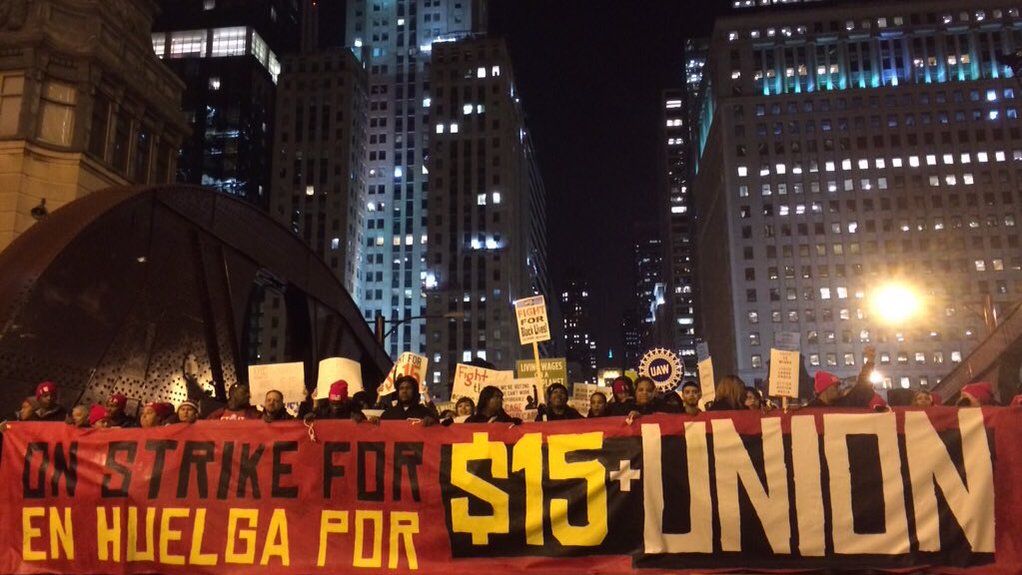Labor & Economy
Not Debatable: Minimum Wage Movement Gains Ground

Last night’s Republican debate got underway following a day of national demonstrations in favor of raising the American minimum wage to $15 an hour — a day of protest accompanied by nothing-to-lose strikes by fast-food workers. The debate began with a question about raising the minimum wage. The first candidate to speak said America’s wages were, in fact, “too high” and that the current federal minim wage of $7.25 has to stay where it is.
The second presidential hopeful argued that the reason there are high unemployment rates among young African Americans is “because of those high wages.” The next candidate followed by calling the minimum wage “a disaster” for the 20th century and predicted catastrophe for the 21st should the day come when higher wages “make people more expensive than a machine.”
For a moment it looked as though the debate would become a contest to see which candidates would lower the minimum wage the most. But the momentum is actually headed in the other direction, thanks to the efforts of thousands of grassroots activists and the state and local governments they’ve prodded into drafting wage legislation. Consider just a few recent developments:
- In Oregon, a labor-led coalition is pressuring state legislators to raise the minimum wage to $13.50 an hour over two years – or it will place the choice before voters as a ballot measure.
- Los Angeles County’s Board of Supervisors has raised the minimum wage to $15 by 2020 in the county’s unincorporated areas.
- Berkeley’s City Council has tentatively approved raising the minimum wage at businesses employing more than 55 workers to $15 an hour by 2018. (This, after the city’s Commission on Labor had proposed raising the citywide minimum wage to $19 an hour in 2020.)
- There are not one but two union-backed initiatives to raise the state minimum wage to $15 an hour that have been proposed for California’s 2016 general election.
- A Pasadenans for a Livable Wage campaign is trying to measure popular support for a $15 an hour wage in the City of Roses. So far the city council has begun discussions on the wage, as have the city councils of Santa Monica and Long Beach.
- Even in right-to-work Texas, where it is illegal for a municipality to establish a minimum wage, a campaign is moving forward to create a living wage for city employees in San Antonio.
In fact, by the time Tuesday’s debates had begun, New York Governor Andrew Cuomo had already announced earlier that day that New York was raising its minimum wage for state employees to $15 an hour by 2021 – a national first for public sector workers. If anything, the next president will find higher minimum wages in more places across the country as he or she takes office – and that’s not debatable.
(Photo: Fightfor15

-

 The SlickJanuary 23, 2026
The SlickJanuary 23, 2026Yes, the Energy Transition Is Coming. But ‘Probably Not’ in Our Lifetime.
-

 The SlickJanuary 27, 2026
The SlickJanuary 27, 2026The One Big Beautiful Prediction: The Energy Transition Is Still Alive
-

 Column - State of InequalityJanuary 29, 2026
Column - State of InequalityJanuary 29, 2026Are California’s Billionaires Crying Wolf?
-

 Latest NewsFebruary 3, 2026
Latest NewsFebruary 3, 2026Amid the Violent Minnesota Raids, ICE Arrests Over 100 Refugees, Ships Many to Texas
-

 Dirty MoneyJanuary 30, 2026
Dirty MoneyJanuary 30, 2026Amid Climate Crisis, Insurers’ Increased Use of AI Raises Concern For Policyholders
-

 Featured VideoFebruary 4, 2026
Featured VideoFebruary 4, 2026Protesters Turn to Economic Disruption to Fight ICE
-

 The SlickFebruary 2, 2026
The SlickFebruary 2, 2026Colorado May Ask Big Oil to Leave Millions of Dollars in the Ground
-

 Column - State of InequalityFebruary 5, 2026
Column - State of InequalityFebruary 5, 2026Lawsuits Push Back on Trump’s Attack on Child Care

